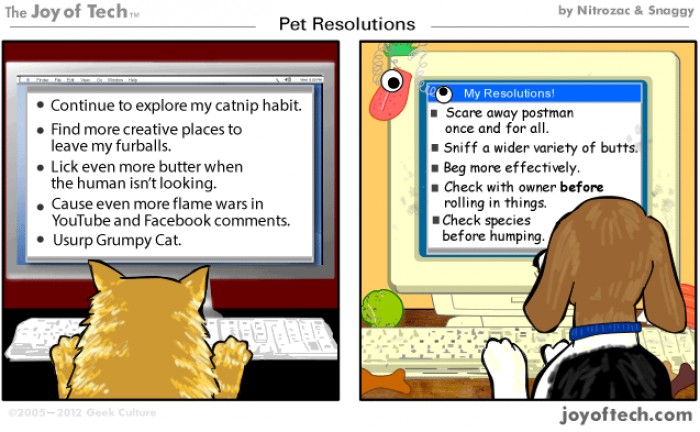We are all familiar with the tradition of making New Year’s resolutions. Things we want to do better this year. Things like lose weight, save money, or be more helpful to others.
At the beginning of the New Year, many people make resolutions to drop some pounds, quit smoking, get organized or even save money. Three weeks into the New Year, there is often a drop in your performance and you find yourself falling into bad habits.
According to Time Magazine, the top five most commonly broken resolutions are:
- Lose Weight and Get Fit
- Quit Smoking
- Learn Something New
- Eat Healthier and Diet
- Get Out of Debt and Save Money
Why are we bringing up New Year resolutions in late January, you ask? And what are people resolutions doing in our veterinary blog?
Well, A: Because we’ve all had some time to make or break some resolutions.
And, B: Believe or not, we have an unexpected ally in the battle to keep our resolutions: our pets!
Keep reading to learn how we can ALL benefit from making and keeping some common resolutions.
 1. Lose Weight and Get Fit
1. Lose Weight and Get Fit
According to the American Veterinary Medical Association, it is estimated that between 25 and 40 percent of dogs and cats and 31 percent of people in this country are overweight. Studies have found that other domesticated animals, including horses, are also prone to obesity.
From doga to hiking, skijoring to kayaking, it’s easier than ever for people to incorporate their pet into a new exercise routine. It’s a great way to bond, it’ll get you both out of the house, and both owner and pet will reap the rewards of a healthy physical activity. Meet-up groups are a great way to find like-minded pet owners to join you in your exercise, too!
This year, let’s resolve to find an activity enjoyable enough that we and our pets will want to stick to it!
 2. Quit Smoking
2. Quit Smoking
By now, we all know that smoking is bad for your health. But did you know it is also harmful to your pet?
In recent years, studies have concluded that tobacco and secondhand smoke are not only dangerous to people, but also to pets. Specifically, with respect to secondhand smoke, researchers have found that exposure to tobacco smoke has been associated with certain cancers in dogs and cats; allergies in dogs; and eye and skin diseases and respiratory problems in birds, according to the researchers.
This year, let’s resolve to quit smoking for ourselves, our families, and our pets.
 3. Learn Something New
3. Learn Something New
Studies show that mental stimulation can help reduce cognitive deterioration in aging animals. In other words, keeping your senior pet’s brain active can actually make it healthier! Teaching your pet new tricks and practicing those they already know are a great way to keep those neurons firing. Puzzle feeders, which force a pet to think through a task in order to be rewarded with a treat, are also an excellent way to keep a pet’s mind engaged.
This year, let’s resolve to take our pet to a training class. Maybe we will both learn something new!
 4. Eat Healthier and Diet
4. Eat Healthier and Diet
Many owners “eyeball” their pet’s daily intake and pour that into a bowl, usually resulting in overfeeding and weight gain.
We’ve seen “measuring cups” of all sizes. It’s important to use an 8-ounce measuring cup to ensure your pet isn’t taking in more calories than they need. The recommended feeding guidelines on the bag are good place to start to figure out how much food your pet really needs. Older pets and those who have been neutered usually have lower energy needs than young, intact animals.
This year, let’s resolve to watch the portions for ourselves and our pets. We can also resolve to eat more veggies and share some healthy snacks with our little buddies!
 5. Save Money
5. Save Money
Guarantee your pet-related financial health by starting a pet savings fund.
Sometimes, budget limitations do not allow for the purchase of a pet insurance policy. For these pet owners, a personal pet care fund is a great alternative. Open an account that’s designated for pet care funds, but be sure to get an ATM card or checks for the account, so the funds are available at all times. Contribute whatever amount is within budget, but be sure to contribute on a regular basis – even if it’s only $5 or $10 a week.
Pet owners can also start a pet care fund with tax return money, with money from working overtime, or with money earned working odd jobs, like babysitting or yard work.
This year, let’s resolve to to stock away a little money each month in case of a pet emergency.
May you and your pet discover all your hidden potentials this New Year and turn them into delightful ventures! Working on a resolution not listed here? We would love to hear about it!

